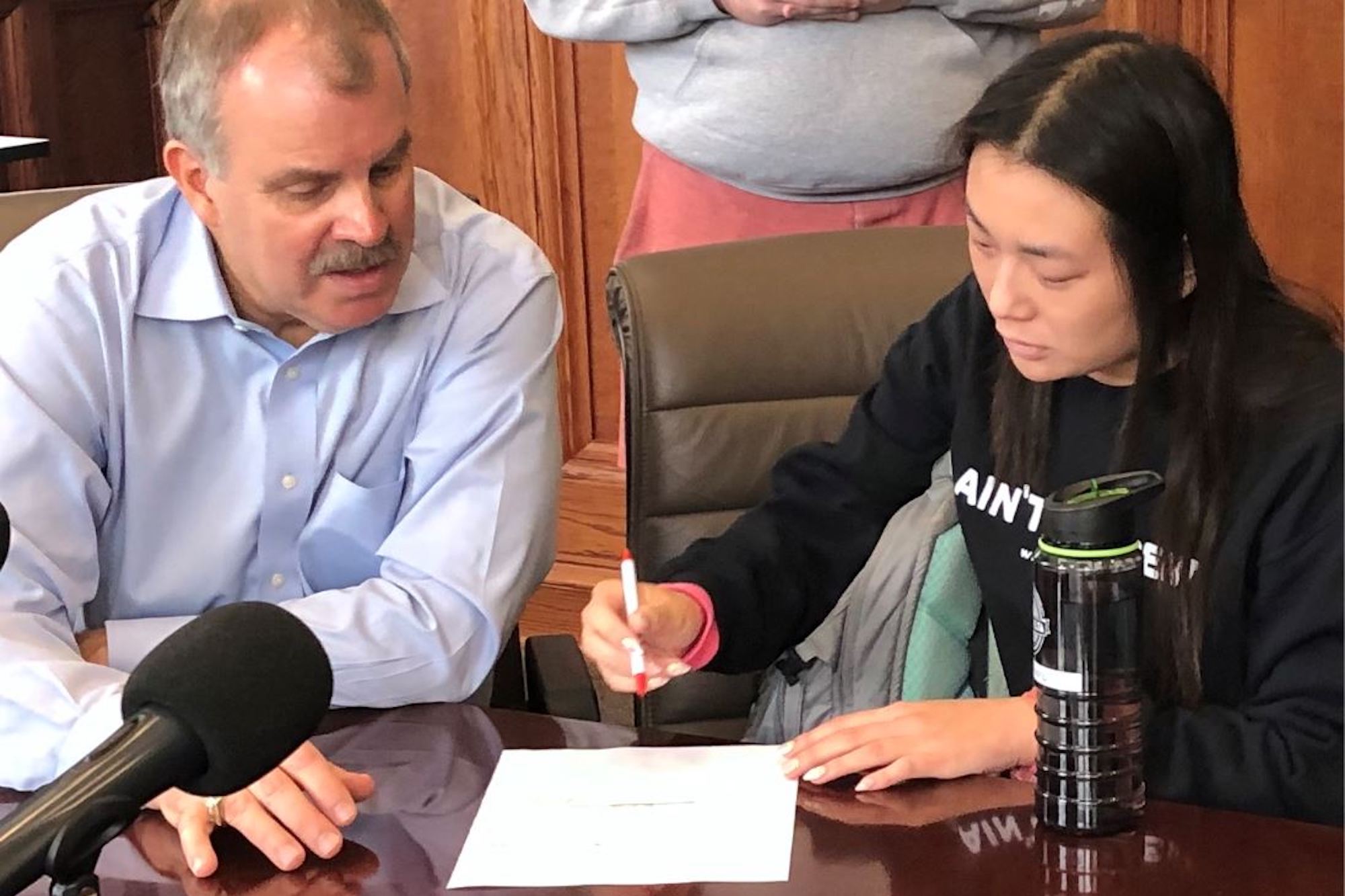University of Mississippi Ombudsman Paul Caffera is back at work months after he became ensnared in the administration’s effort to root out a group of whistleblowers who unearthed a collection of emails between university officials and wealthy donors who expressed racist views. The Mississippi Free Press reported on those emails last August.
Chancellor Glenn Boyce placed Caffera on administrative leave in December after members of the university’s journalism faculty raised suspicions that he may have been connected to the anonymous whistleblowers. But a four-month-long investigation involving at least 30 witness interviews turned up no evidence to corroborate those claims.
“Paul Caffera will resume his responsibilities as the University Ombuds, effectively immediately. I look forward to him once again serving the UM community,” Chancellor Boyce said in a letter sent out to UM faculty, staff and graduate students this evening.
In a statement this evening, Caffera’s attorney Goodloe Lewis said his client “steadfastly adhered to his ethical obligations” by refusing “to disclose any confidential information” about faculty or staff members who had used his service.
“He did so despite being placed on administrative leave and further being threatened with adverse employment action (not to mention possible criminal action) for refusing to answer questions that sought to invade the confidentiality of the Office of Ombuds.”
The Office of Ombuds provides faculty, staff and graduate students a confidential place to raise concerns and issues without fear of retaliation because the ombuds is bound to protect their identities.
When this publication broke the news that Caffera had been ousted in December, faculty members described his office as their “last refuge,” saying they feared the whistleblower hunt could risk revealing to university officials the names of those who have sought Caffera’s services—potentially opening them up to professional retaliation.
“There is no place on campus where somebody can go except for the ombuds office to be treated fairly and with respect. Paul Caffera as the ombudsman is the only place women can go and talk about their concerns,” one faculty member, speaking on condition of anonymity, told this reporter in December.
Sources Cited Pattern of ‘Witch Hunts’
The Mississippi Free Press published the three-part “UM Emails” exposé in August 2020, revealing the often sordid communications between university officials and some wealthy donors who expressed racist views or threatened to withhold funding over anti-racism efforts on campus.
The unidentified Ole Miss Information whistleblowers, who mostly used pseudonyms based on characters from the George Orwell novel, “1984,” received the emails from Transparent Ole Miss, another whistleblower group that obtained the documents through a public-records request.
In one of those emails in September 2018, Blake Tartt, a 1984 alumni and donor, shared photos with the then-dean of the School of Journalism and New Media that the donor said he had taken of Black women students enjoying a night out in downtown Oxford. He referred to the women as “African Hookers” who were “ruining” the town and university’s culture.
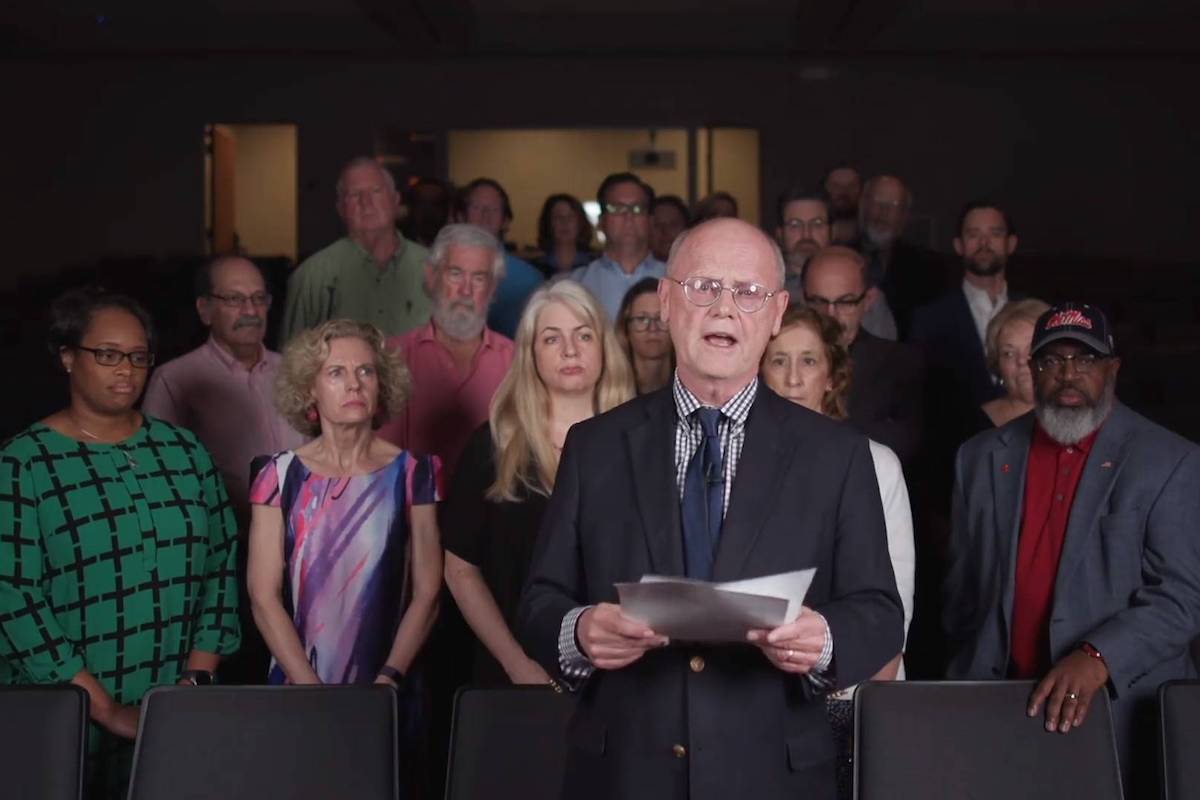
Days later, then-journalism school namesake Ed Meek posted some of the photos that Norton had received from Tartt on Facebook, expressing concerns about Oxford’s culture and “values.” Meek drew widespread condemnation, including from Norton, who said the post had a “racial overtone” and called for Meek’s name to be removed from the journalism school. Meek apologized and joined calls for his name to come down off the building.
Until the August 2020 exposé, Tartt’s role in the affair remained private and Dean Norton and other UM officials continued pursuing him for funding for the school. The wealthy alum later served on the search committee to find a new chancellor in 2019.
When the Mississippi Free Press was working on the UM Emails exposé last year, several sources explained their decision to remain anonymous by citing what they describe as a “culture of secrecy” and a “witch hunt” that they said journalism school officials had engaged over a prior whistleblower incident.
In one 2018 email in the trove of documents the whistleblowers obtained last year, Ombudsman Caffera referenced “alleged recent efforts of JNM Leadership to persuade a reporter to reveal the name/names of the sources/sources” that “might reasonably persuade an employee of JNM that JNM Leadership could be inclined toward vindictiveness.”
Transparent Ole Miss and Ole Miss Information shared copies of the emails they obtained through public-records requests with the Mississippi Free Press last year.
‘A Hostile Work Environment’
Starting in March 2020, the whistleblowers, using anonymous email accounts, began sharing copies of some of the most offensive emails with administrators and journalism faculty members. After the UM Emails exposé’s publication, they also began sharing links to the Mississippi Free Press articles with faculty members, too.
The whistleblowers later raised questions about pay practices involving former administrators, including Norton, the ex-journalism dean who resigned soon after the public-records request. The whistleblowers also questioned whether or not the journalism school had improperly promoted some faculty members.
“Winston Smith,” one of the pseudonymous Ole Miss Information whistleblowers, raised those concerns in an email to the Office of the Mississippi State Auditor and the Mississippi Institutions of Higher Learning on Sept. 21, 2020.
Four days later, the University of Mississippi Equal Opportunity & Regulatory Compliance Office, which handles Title IX employment issues, began an investigation into Smith and the other Ole Miss Information whistleblowers. University of Mississippi Police also opened a criminal probe into the whistleblowers based on allegations of “harassment” related to their emails to faculty members.
“Beginning September 25, 2020, EO/RC Interim Director Gene Rowzee met with faculty and staff who alleged they were being harassed and targeted because of race and national origin, and in general, as members of the School of Journalism,” reads part of the EORC report. “They alleged the harassment was generally taking the form of pseudonymous emails to faculty and staff and others, social media and website posts, and that current faculty and staff at the University, including the University Ombuds, might be involved.”
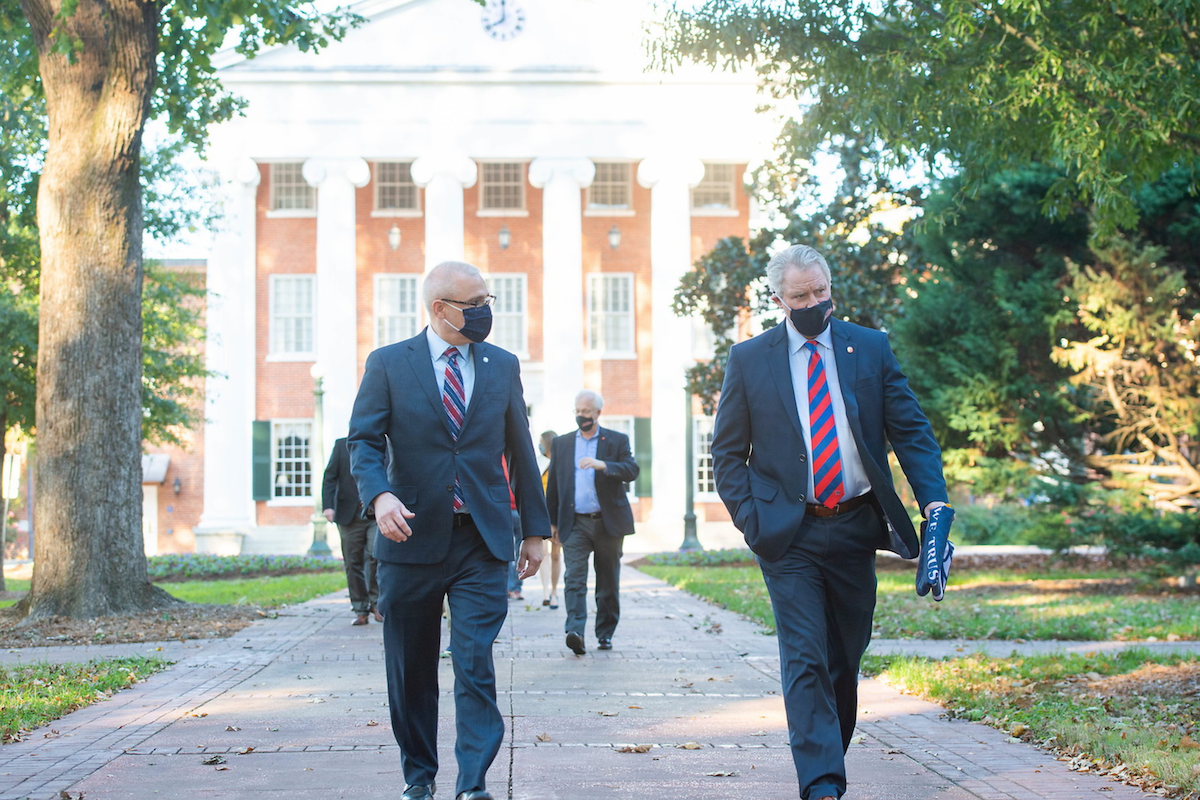
The EORC report cites no examples corroborating those claims, though. The Mississippi Free Press has reviewed dozens of social-media posts and emails by the whistleblowers, much of which focused on one white male donor and white male leaders at the university, including former journalism school Dean Will Norton and Provost Noel Wilkin.
Caffera participated in two interviews with Rowzee for the EORC’s investigation, saying he did not know the identity of the whistleblowers and could not have revealed that information even if he did and could not turn over emails or documents to assist in Rowzee’s investigation.
The ombudsman cited the 2015 Charter Agreement for the Office of the Ombudsman, which says the ombudsman “shall not testify or provide records to be used in any … investigation” and shall “ensure confidentiality of the visitor’s identity and communications.” The charter also says that the ombudsman “shall be protected from retaliation as a result of his/her role.”
In November, Caffera filed a lawsuit seeking to block the university from accessing his emails and other records because doing so could imperil confidentiality for university faculty and staff who have sought his services. Soon after, on Dec. 1, Chancellor Glenn Boyce placed Caffera on administrative leave, appointing William W. Berry, a law school professor, as acting ombuds on Dec. 18.
The EORC completed its report on the whistleblower investigation Jan. 25, but Caffera remained on leave until March 1. Though confidential and not publicly available, the Mississippi Free Press was able to piece together the report based on citations in Caffera’s most recent court filing.
The EORC report says that investigators found “that the School of Journalism is a hostile work environment within EO/RC’s understanding” but that it “could not substantiate or disprove the identity of any employee or University-affiliated person engaged in the harassment.”
“Unsurprisingly, the EO/RC investigation exonerated Mr. Caffera from any wrongdoing, and he has now been restored to his full duties as University Ombuds,” Lewis, Caffera’s attorney, said in his statement this evening. “Mr. Caffera is pleased to be back to serving the UM Community in that position.
“He is gratified and humbled by the overwhelming showings of support he has received from faculty, staff and students, and from his ombuds colleagues around the world. We look forward to resolution of the remaining issues in his lawsuit, primarily concerned with the University’s payment of attorney’s fees Mr. Caffera has incurred in protecting the independence and confidentiality of Office of Ombuds in accordance with the Charter Agreement.”
‘A Mighty Thin Reed’
Rowzee’s EORC report suggests that Caffera’s insistence on keeping Ombuds office communications “confidential” in accordance with the charter made the investigation difficult.
“Because of the Ombuds’ application and interpretation of the current University Ombuds Charter, EO/RC was unable to either substantiate or disprove allegations involving the University Ombuds Office,” Rowzee’s report says. “At the earliest opportunity the University should review the establishment and structure of the University Ombuds Office and the University Ombuds Charter to either clarify and/or develop appropriate oversight and accountability safeguards.”
In a Feb. 25 court filing, Lewis included a formal complaint he sent to Provost Noel Wilkin on Feb. 12 on behalf of Caffera, criticizing the EORC report and saying “Rowzee found no evidence to support any claims against Caffera … because none exists; Caffera did nothing wrong.”
“In fact, it appears that Caffera has been targeted for retaliation—in violation of the Ombuds Office Charter Agreement—because he faithfully and appropriately performed the duties of the job,” Lewis wrote.
At another point in the letter, Lewis claimed Rowzee’s investigation was “unwarranted” and “improperly entangled Caffera.”
“Where is the alleged nexus between Caffera and the anonymous whistleblowers? No evidence alleging a nexus between Caffera and the whistleblowers was ever proffered. … According to Rowzee, in his second interview it was that, ‘they just said that they think you’re somehow involved in some anonymous emails they have been receiving, … and they said they believe you were involved in these emails (they) characterized as harassment….’ The accusers ‘think’ Caffera was involved. That’s it,” Lewis wrote. “This is a mighty thin reed upon which to begin a cursory examination let alone a months-long investigation, allegedly involving over 30 witnesses.”
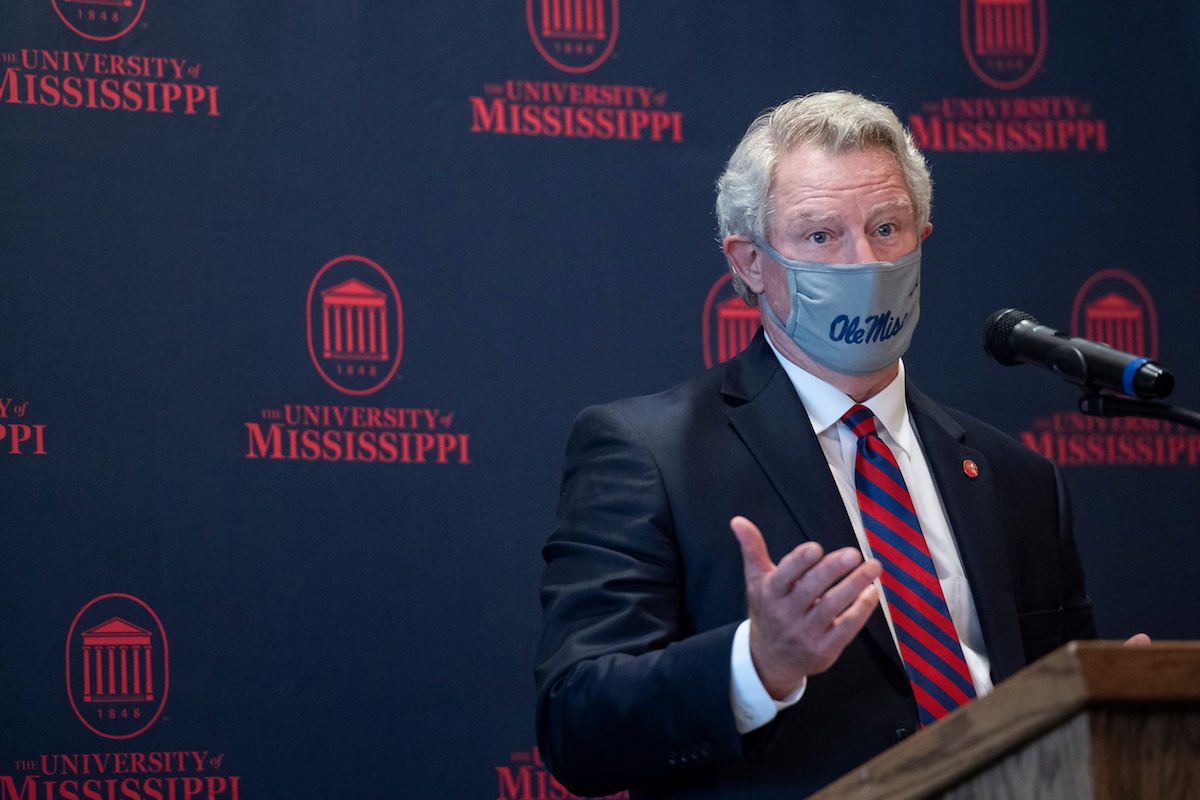
In his letter, Caffera’s attorney also criticized the university’s reaction to the whistleblowers, writing that “merely receiving anonymous emails somebody does not want to read does not create a ‘hostile work environment.’”
“There is no doubt that Mississippi Free Press (hereinafter ‘MFP’) articles published in August of 2020, concerning a University of Mississippi alumnus, and Houston-based real estate developer named Blake Tartt, III (‘Tartt’) and former Journalism Dan H. Wilbert Norton (‘Norton’), caused a stir amongst University of Mississippi faculty, former faculty, and the community in general,” Lewis wrote.
The lawyer noted that, after a journalism school faculty member publicly “criticized the journalism standards of the MFP,” they “had (their) own public critique of the MFP subjected to public critique by one of the public-interest whistleblowers.” (Several members of the journalism faculty criticized the Mississippi Free Press’ “UM Emails” exposé, including on Twitter and Facebook, which editor Donna Ladd previously addressed in an editor’s note.)
Most of those faculty members were present in a September 2018 faculty meeting where two people identified Tartt as the likely source of the photos. A leaked recording of that meeting made its way to Mississippi Today. No journalist, however, reported Tartt’s role before this publication’s series in August 2020. At least two journalism faculty members also tried to discredit a former professor who went on the record in the series while speaking to the editor of the Mississippi Free Press last August, but without evidence.
“Although Caffera is not part of the whistleblowing groups, and has not sent anonymous or pseudonymous emails to anyone in or affiliated with JNM, it is important to note the impropriety of the University’s actions in attempting to unmask and or punish the whistleblowers. … The University appears to be attempting to punish people for banding together and speaking out on issues of public concern, consistent with both their First Amendment and Fourteenth Amendment Rights,” Lewis wrote.
The attorney added that “the whistleblowers appear to have taken all of the necessary steps to cloth themselves in the protection of both the State of Mississippi’s whistleblower protection law and the University’s own whistleblower protection policy.”
Concerns Over ‘Confidentiality’ Remain
This evening, Lewis shared a statement with the Mississippi Free Press from Caffera, speaking “in his capacity as a member of the International Ombudsman Association”—not as a UM employee.
“Institutional ombuds around the world work tirelessly to provide confidential, neutral, independent, and informal places for members of their organizations to bring forward issues of concern in a safe and productive manner. The confidentiality of ombuds offices allows Ombuds to give voice to the voiceless and help promote more harmonious, just, and productive workplaces,” said Caffera. “Ombuds also endeavor to ensure that workplace processes treat people fairly and provide safeguards against using such processes to abuse people.
“Ombuds charter agreements that recognize the confidentiality of the ombuds office, protect ombuds from retaliation, and ensure access to legal representation paid for by their employer are essential components of a robust and effective ombuds program. It is essential for any organization that employs an ombuds to fully honor their ombuds charter, to stand behind the confidentiality of the ombuds office, and to protect their ombuds from any attempted retaliation.”
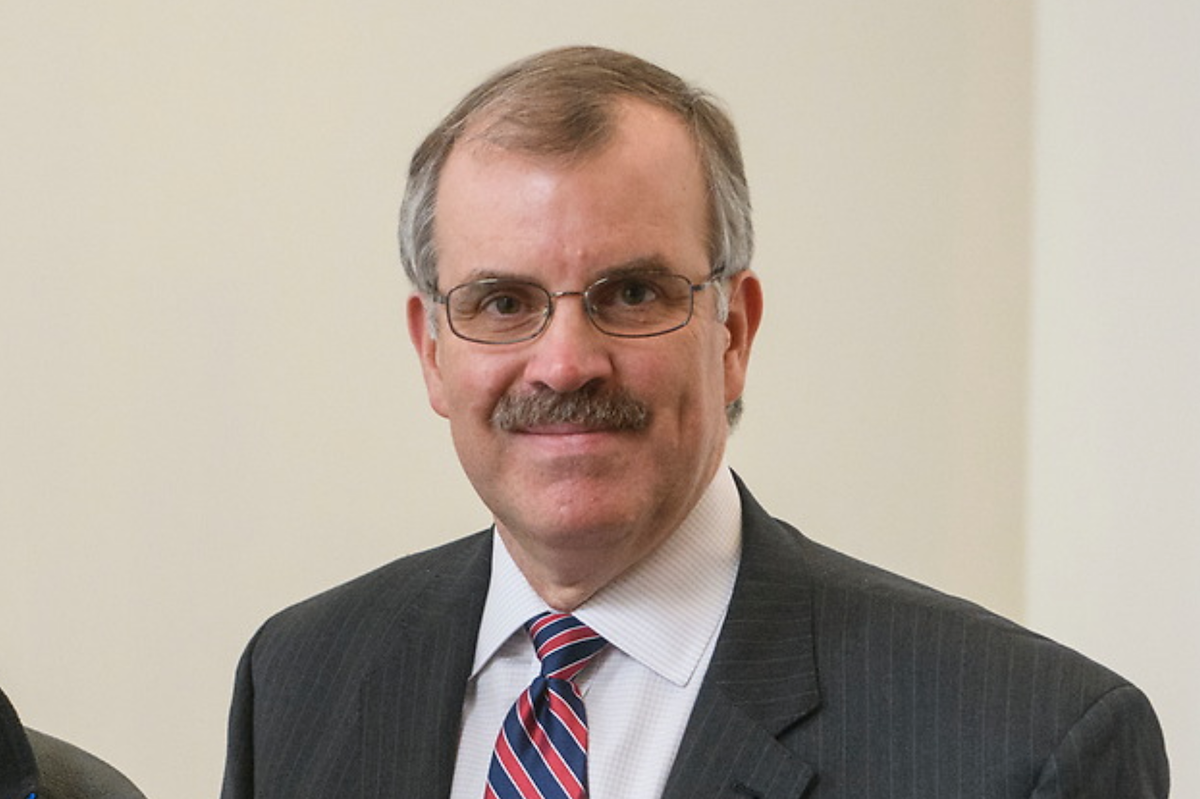
In two statements late last year, Boyce highlighted that cornerstone of “confidentiality” while describing the Office of Ombuds. In a Dec. 15, 2020, statement, for example, he described it as “a confidential, neutral, independent and informal place to seek assistance voluntarily.” On Dec. 18, Boyce called the Office of Ombuds “an independent, confidential office where faculty, staff and graduate students can seek assistance with campus-related concerns.”
Today’s statement announcing Caffera’s return, though, does not include language on confidentiality.
“As I shared in a previous message, the university is committed to maintaining this important function on our campus as a neutral, independent and informal place to seek assistance voluntarily to bring forth and resolve campus-related concerns,” Boyce said in today’s announcement.
A source familiar with the drafting of the announcement, speaking on background, told the Mississippi Free Press that the word “confidential” appeared in an earlier draft of the announcement but “was removed.”
Caffera’s lawsuit, which asks the court to order the university to comply with and uphold the ombuds’ confidentiality requirements and also to reimburse his attorneys’ fees, remains ongoing.
The Mississippi Free Press left a message with the University of Mississippi’s communications office today asking for a call back to discuss this story, but did not hear back by press time. No university officials have agreed to an interview with the Mississippi Free Press to discuss the whistleblowers and the emails they uncovered nor the ombudsman situation since August 2020.
Editor’s Note: In the reporting of the UM emails series and follow-up reports, the MFP did not confer with members of either of our boards or any donors associated with the University of Mississippi to avoid conflicts of interest.
Also see: From Racist Emails to ‘Witch Hunts’: A UM Emails Timeline
Watch: Reporter Ashton Pittman and Editor Donna Ladd discuss the series during the 2021 Ancil Payne Award for Ethics in Journalism ceremony (40:00) and read more about the award here.
Read the full UM Emails reporting series to date:
- ‘The Fabric Is Torn In Oxford’: UM Officials Decried Racism Publicly, Coddled It Privately
- ‘The Ole Miss We Know’: Wealthy Alums Fight To Keep UM’s Past Alive
- UM’s ‘Culture Of Secrecy’: Dean Quit As Emails Disparaging To Gay Alum, Black Students Emerged
- ‘Appalling’: UM Provost Decries ‘Hurtful’ Emails About Black Women, Gay Alum
- Ole Miss’ Coddle Culture: Ole Miss Will Stay ‘Ole Miss’ Without Radical Shift
- EDITOR’S NOTE: The Decisions, Process, Motives Behind Ashton Pittman’s Series On UM Emails
- Perpetuating Patterns: It’s Time To Build A Better University Of Mississippi
- After UM Emails, Dean Plans ‘Anti-Racist’ Training, Donor Changes to ‘Remake Our School’
- ‘Ole Miss’ Vs. ‘New Miss’: Black Students, Faculty On How To Reject Racism, Step Forward Together
- UM Closely Guards Climate Survey Providing Window Into Social Issues, Sexual Violence
- UM Probes Whistleblowers Who Exposed Racist Emails As Ex-Dean Keeps $18,000 Monthly Salary
- ‘Our Last Refuge’: UM Faculty ‘Terrified’ As Officials Target Ombuds In Bid To Unmask Whistleblowers
- ‘Like He Was Disappeared’: UM Faculty Fear Retaliation After Ombudsman Put On Leave
- UM Appoints Acting Ombuds As Weary Faculty See Effort To ‘Stamp Out’ Anti-Racism Voices
- UM Retaliating Against Ombudsman for Protecting Visitors’ Privacy, Org Says
- UM Accuses Ombudsman of ‘Raising False Alarms’ Over Whistleblower Investigation
- A Matter Of Trust: UM Controversy Shows How Ombuds Programs Should, Shouldn’t Function, Expert Argues
- UM Pursuing ‘Criminal Investigation’ Into Whistleblowers Who Exposed Racist Emails
- Ombuds ‘Exonerated’ As UM Emails Whistleblower Hunt Fails to Identify Sources
- Will Norton, Ex-Dean in ‘UM Emails’ Race Saga, Quietly Departs University

